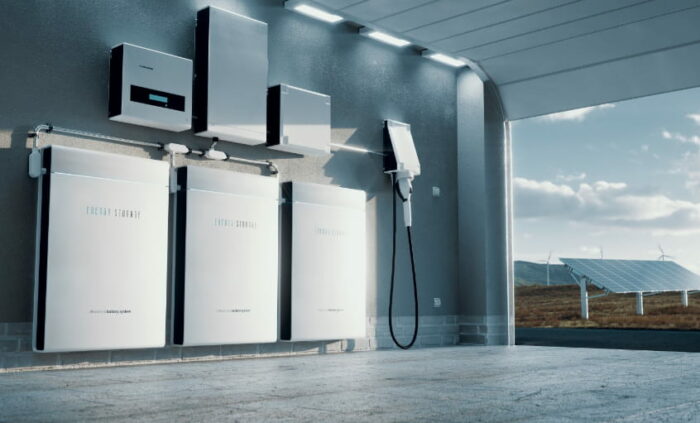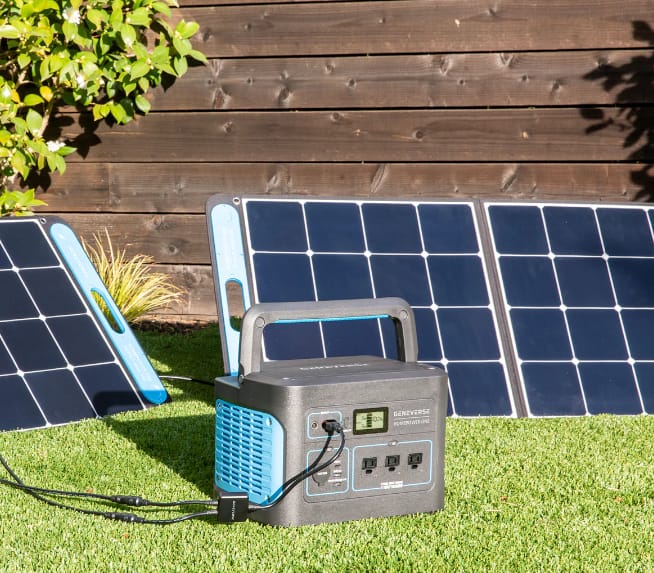Some power outages are short and sweet. After a few seconds of the black screen, the power is back on. Others can last for days, keeping you sleeping in the dark until the electrical company turns the juice back on.
A home battery backup system can help you back up and running quicker if a prolonged power outage hits your area. But choosing which one to get can be tough with so many models on store shelves and online.
The good part is there are plenty of excellent options, and they’re all competitively priced. DIY home battery backup systems are also available if you want to save money and install the system yourself. How, then, can you choose which is best for you?
How Does a Battery Backup System Work?

A battery backup system is designed to keep the power running in your home during a power outage, and it might rank among the essential family protection investments.
A battery backup system uses a set of batteries to provide power to your home during a power outage. If you have a grid-tied solar panel system, you may also have a battery backup system installed so that the power from your panels can be stored for use at night or during cloudy days.
A battery backup system consists of two parts: a power inverter, which converts the current from your main power supply into an alternating current (AC) that’s safe for your home, and a battery, which stores electricity and releases it when needed.
When no power comes from the grid, the inverter takes over. It converts AC into DC, which is then stored by the battery. Once enough energy is stored, the inverter powers your home’s appliances directly from its batteries.
This means that when something like a blackout occurs and your electricity goes out completely, you won’t be left without power—as long as you have a battery backup system installed!
Whole House Generator
When the power goes out, a whole-house generator powered by diesel, propane, or natural gas will keep your home functioning normally. It’s perfect for people living in rural areas or areas prone to frequent power outages and blackouts.
The most vital thing you can do to prepare for an outage is to ensure you have a working generator ready. The only way to ensure a generator will work when you need it most is by having it tested once or twice yearly.
When you start looking at generators, keep in mind that they’re not all created equal. Here are some considerations to make before choosing one:
Size: You’ll want a large enough generator to provide enough power for your entire home when necessary. However, if you don’t have enough space for it, look into smaller options like portable ones instead of larger ones that require permanent installation on your property.
Fuel type: Some generators run on propane, while others run on natural gas or diesel fuel (or both). If possible, choose one that runs on propane since this fuel source is less expensive than others and won’t leave sooty residue from burning as diesel does!
Output capacity: This is the maximum amount of power a generator can produce. The higher the output capacity, the more electricity it can provide for your home before needing to be refueled.
Noise level: No one wants a loud generator! If you’re looking for something quiet enough to run overnight without disturbing your neighbors or nearby wildlife, look for ones with lower decibels (less than 65).
Solar Generator

One of the best home battery backup systems is a solar generator. Solar generators are a relative innovation in home energy. Still, they are quickly becoming famous for homeowners who want to be self-sufficient and save money on their electricity bills.
A solar generator uses sunlight to generate power for your home’s electrical needs. This means that you can use your solar generator when there is no sunlight (such as at night) or use it during the day when sunlight is plentiful.
The power your solar generator can generate depends on how large your solar panel array is and how much sun exposure it receives throughout the day.
When you install a solar generator system in your home, it will include the following:
- Solar panels (which convert sun rays into electricity)
- An inverter (which converts direct current into alternating current)
- Batteries (which store excess energy so it can be used later)
Managing Your Energy Options
As the world is becoming increasingly dependent on renewable energy sources, we must find ways to store them. Several different types of batteries on the market today can be used for this purpose.
Some are very expensive, and others are less expensive but not as durable. The most widely used examples are as follows:
Lead Acid Batteries
These types of batteries have been around for many years, and they have proven themselves time and time again as being reliable and easy to maintain.
They come with a built-in charger, which means no additional equipment is required to charge them up again after they have been entirely down until there’s nothing left inside!
NiCad Batteries
These are another type of rechargeable battery that has been around for many years. They are commonly used in electronic devices that need power quickly but don’t use very often because the charge will last for only a short period before needing to be recharged again.
The downside to these batteries is that they have a shorter life span than other types of battery systems and require more maintenance and care.
Lithium Ion Batteries
This is another type of rechargeable battery commonly used in electronic devices. These batteries have a longer life span than other types of rechargeable batteries, and they also require less maintenance and care. These batteries are commonly used in laptops, cell phones, and other similar devices.
Conclusion
The ideal home battery backup system is the one that’s right for your home and budget. Some models are much easier to install than others; some are more durable, while others offer more features or better warranties.
But there are a few things to look out for regardless of which model you choose: Make sure it has enough juice to run your appliances during a power outage.
You can build your own solar battery backup using off-the-shelf components, ensuring you don’t spend a lot of money while still enjoying the benefits of accessing power from the sun.
 Jessica Paster The Future is Green
Jessica Paster The Future is Green